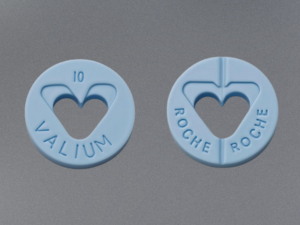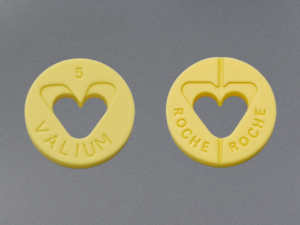Showing all 2 results
-
Valium 10mg
Select options This product has multiple variants. The options may be chosen on the product pageValium 5mg
Select options This product has multiple variants. The options may be chosen on the product pageHow Does Valium Work?
In the benzodiazepine pharmaceutical class, which serves as an anxiolytic drug, valium has a place.
Additionally, the World Health Organization (WHO) has duly awarded it a spot on its list of essential medications. Since it is a scheduled medication, it is prohibited to purchase or sell it without a current prescription.
A nearby pharmacy may sell the drug, or you can buy Valium online.
How Is Valium Taken?
Your doctor will begin your treatment at the lowest dose that is feasible and will change it up or down as needed.
Your specialist should properly examine you in order to determine which measurements are best for you.
The following factors will be taken into consideration when your specialist approves your Valium measurements:
- The patient’s age and weight
- The patient’s state of therapy
- Another is causing disruption to those who are enduring
What is the understanding’s initial response to the medication’s dosage?
Consume Valium in accordance with your doctor’s recommendation, and read and follow all directions on the medication label.
If you do not notice any improvement in your condition, please inform your specialist and refrain from using it more frequently than is recommended.
Avoiding restorative errors is preferable, and you should make an effort to remain steady throughout your treatment.
The typical dosage of Valium that your doctor can recommend for you is as follows:
either as verbal agreements or tablets
Dosage For Anxiety Treatment
Experts should exercise extra caution when recommending dosages for older adults (65 years of age or older) because their internal organs may not function as well in these individuals. Initially, doctors will recommend taking 2.5 mg to 2 mg of the medication once or twice daily.
When treating adults (18 years of age or older but under 65), your physician will begin with 2 mg to 10 mg of medication, which you must take twice or four times daily.
Children aged six months or younger but under eighteen (18 years): 1 mg to 2.5 mg, taken three or four times daily.
If necessary, your specialist will adjust your pharmaceutical measurements.
for young ones (less than six months)
It is not advised to use Valium to treat infants younger than six months.
Dosage For Supervising The Withdrawal Of Alcohol
Physicians will initially recommend 2 mg to 2.5 mg of the medication once or twice daily for older adults (65 years of age or older).
In the case of adults (18 years of age or older but under 65 years of age),
your physician will begin your treatment with 10 mg of the medication, which you must take within the first 24 hours of the diagnosis. After that, your physician will reduce your dosage to 5 mg, three to four times an hour.
Physicians will determine the corrected dosage of Valium for children (18 years of age or younger) following a thorough and appropriate restorative examination.
How Much To Take To Treat Muscle Spasms
For adults who have more life experience (65 years or older)
First, 2 mg to 2.5 mg of verbal Valium tablets or an arrangement once or twice a day; your physician may adjust your medication dosage if necessary.
When treating adults (18 years of age or older but under 65), your physician will begin with 2 mg to 10 mg of the medication, which you must take twice or four times daily.
Children aged six months or younger but under eighteen (18 years): 1 mg to 2.5 mg, taken three or four times daily. Your doctor will adjust the dosage of your medication if necessary.
for young ones (less than six months)
Children younger than six months old shouldn’t be treated with valium.
Dosage To Treat Convulsions
For adults who have more life experience (65 years or older)
Experts should exercise extra caution when recommending dosages for older adults because their internal organs may not function as well. First, doctors will recommend taking the drug once or twice daily at a dose of 2 to 2.5 mg.
For adults (18 years of age or older but younger than 65)
The recommended daily dosage for the medication is two to ten milligrams, taken three or four times. If necessary, your specialist will adjust your pharmaceutical measurements.
Your specialist will begin your treatment with 1 mg to 2.5 mg of medication, three or four times a day, if you are a child (6 months or older but under 18 years old).
for young ones (less than six months)
Treating infants younger than six months old with valium is not advised.
Keep Valium pills away from heat, light, and moisture, and store them at room temperature. Keep Valium pills out of children’s reach, as they may misuse them. Talks with pharmacists or drug specialists after your treatment is over will help ensure that any additional medication is transferred to you appropriately.
What Have You Heard Recently About Valium Use?
You must handle the following tasks that have come up lately using Valium:
- As your doctor has recommended, take Valium as prescribed.
- Long-term Valium use can lead to physical or mental dependence on the medication.
- Medical professionals do not recommend Valium for the treatment of patients younger than six months.
If you have an adverse reaction to Valium, any of its ingredients, or similar medications, please refrain from taking it.
If any of the following health problems apply to you, your doctor will not recommend Valium:
- muscular deficiencies such as myasthenia gravis
- Breathing difficulties
- Apnea during sleep: cessation of breathing
- glaucoma with narrow angles
- Excessive open-angle glaucoma
- liver damage.
If you have a history of drug or alcohol dependence, stay away from taking Valium.
If you have the following conditions or have ever had them, you are not allowed to take the prescribed medication:
- Breathing problems
- The glaucoma
- liver damage
- kidney illness
- Epilepsy
- Depressive States
- Variations in mood
- A behavioral or mood disorder
- harmful or self-destructive actions
When Valium is used while pregnant, the fetus may suffer harm and become both physically and mentally dependent on the medication.
- It’s possible that using Valium while breastfeeding is unsafe.
- It’s best to speak with your specialist or give the Harm helpline a call at 1-800-222-1222 if you overdose on Valium.
- It is best to disclose to the specialist all of your current medications or treatments.
Keep in mind that taking Valium is only one part of treatment; follow your doctor’s advice to maximize the medication’s effectiveness. See your specialist for routine therapeutic checkups on a regular basis.
Please do not start or stop taking medications suddenly, as you might experience withdrawal symptoms or certain bounce-back symptoms.
Steer clear of vitamins, over-the-counter medications, homegrown goods, and other healthy supplements when taking Valium.
If you must order Valium online, make sure it comes from a reliable online retailer.
Consult your specialist about all the important precautions you should take when taking Valium.
To find out more about the advantages and disadvantages of Valium, speak with your specialist.
What Advantages Do Valium Uses Offer?
Physicians recommend Valium for the treatment of certain health issues, like
- Panic episodes and anxiety
- agitation vertigo
- Benzodiazepine disorder or alcohol opioid
- cluttered sleep (insomnia)
- muscles tense up
- The Tetanus
- robust spastic paresis
- inflexible individual syndrome
- Anything more that they may decide
What Effects Does Valium Have on You?
Following Valium use, you may experience some of the following side effects:
- Slumber
- Exhaustion
- weakened muscles
- Dizziness
- issues with muscle contractions
These mild side effects might require you to deal with them because they will eventually be validated.
However, suppose that you sense that these negative effects are growing worse every day. The best course of action in that situation would be to speak with your specialist right away and seek out therapeutic assistance.
When using Vicodin, cease using it and notify your doctor if you suffer from:
- extreme sleepiness or inebriation
- Variations in mood
- A behavioral disorder
- Sadness or unease
- destructive or self-defeating actions
- Bewilderment
- Delusions
- difficulty falling asleep
- either convulsions or seizures
Any other extremely adverse reaction to the medication
How Do You Take Valium?
As a central nervous system depressant and benzodiazepine, Valium functions by enhancing or increasing the effects of gamma-aminobutyric acid (GABA) in the brain.
Things to Avert When Taking Valium?
Valium can make it difficult for you to think clearly and react appropriately in certain situations. When operating heavy machinery or driving, exercise caution.
Don’t include in tasks that call for attention to detail and dexterity. If possible, avoid using alcohol and grapefruit juice or pulp at the same time as Valium.


